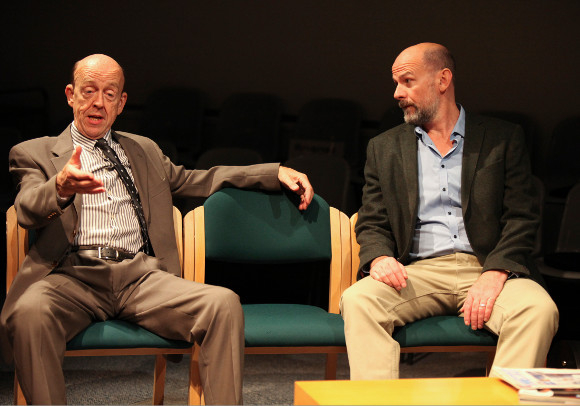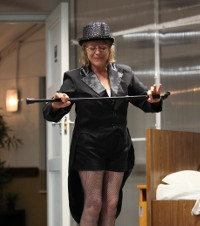The Last Yankee

© Ellie Kurttz
I would walk over hot coals to see most plays bearing Arthur Miller's name, but his later works are an admittedly patchy bunch.
The Last Yankee, however, is among the better examples of Miller's post-70s output, and stands up well in this evocative revival by Cathal Cleary at the Print Room.
Cleary and designer Jamie Vartan have transformed the boutique Notting Hill space into an immersive psychiatric ward, the setting for Miller's four-hander which centres on two couples dealing with the fall-out of depression.
In the opening scene, Frick (Andy de la Tour) and Leroy (Paul Hickey), compare notes in the waiting room about their wives, who are both receiving treatment at a New England "nut house" (Frick's words).
The men are chalk and cheese in every sense – symbolised by the fact Leroy has seven children, where Frick has none – and tensions soon develop when Frick makes characteristically crass comments about Leroy's lowly status as a carpenter.

© Ellie Kurttz
The intelligent, sensitive Leroy transpires to be the 'last Yankee' of the title, tracing his lineage back to founding father Alexander Hamilton. Miller is here making a (surprisingly right-wing) point that the traditional values of America are being lost; Leroy's Swedish wife Patricia (Matilda Ziegler) is even made to represent an invasion of foreigners.
But Miller saves most of his scorn for the issue of mental health treatment. The most tragic figure is Frick's wife Karen (Kika Markham), who is almost lobotomised by pills. The centrepiece scene, in which Karen tap-dances while her husband reluctantly croons "Swanee River", is superbly played and shows a clear glimpse of Miller at his best.
The Last Yankee is far from perfect – at times the dialogue meanders and the narrative feels stretched thinner than it can stand – but here it's staged and performed with admirable commitment.
The only real directorial misfire is the decision to hand out sweets as 'Prozac' afterwards, an almost gobsmackingly flippant gesture. And I'm not convinced that asking actress Tracey-Ann Wood to sleep on a bed through the entirety is a necessary measure.
But nevertheless, this is a welcome revival – suggested to Cleary by Michael Grandage (who directed the play at Colchester in 1996) – of a piece that makes salient points about the treatment of depression which resonate well beyond the Yankee homeland.
The Last Yankee continues at the Print Room until 5 October 2013










